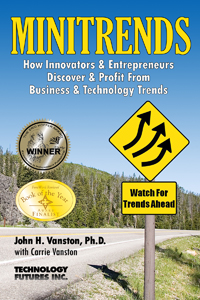Accenture IT Report Encourages Businesses to Lose Control
by Steve O'Keefe on February 22, 2011
 Is your business ready to lose control? That appears to be the direction of enterprise computing, according to a new set of predictions just released by management consulting powerhouse, Accenture.
Is your business ready to lose control? That appears to be the direction of enterprise computing, according to a new set of predictions just released by management consulting powerhouse, Accenture.
In the free report, Accenture Technology Vision 2011, Accenture’s information technology (IT) team, led by Kevin Campbell, chief executive of the company’s technology group, reviewed such sources as the subjects of keynote speeches at technology conferences, the types of projects receiving venture capital funding, and the predictions of well known IT experts. These sources are similar to those John and Carrie Vanston recommend consulting when analyzing the viability of trends in their book, MINITRENDS. The Accenture report arrives at a short list of eight trends that are transforming IT.
Accenture sees “a world of IT that barely resembles what enterprise computing looks like today,” according to Gavin Michael, Accenture’s managing director of research and development, as quoted by TMCnet reporter, Rajani Baburajan. “IT is no longer in a support role. Instead, it is front and center driving business performance and enriching people’s lives like never before,” Michael said.
Accenture sees three major rivers running through its predictions:
- Greater Distribution of Data: “Data is dispersed across many more locations, and under the control of far more owners.”
- The Separation of Software and Hardware: “Technology today enables decoupling of entities and layers once deemed inseparable.”
- The Meteoric Rise of Analytics: “Analytics will become the super-tool with which to drive more agile and effective decision-making.”
You have to be something of a mindreader to parse the jargon of the report and glean the pearls of wisdom it contains, but they are there. Accenture sees decentralization at the core of technology trends, such as cloud computing, which we have frequently covered on this blog.
The report’s insight that IT security needs to move from a “fortress mentality” to a layered and distributed series of security checks is prescient, as is the awareness that greater automation in security and the ability of software to handle “noise” will improve results. Imagine how the technology behind IBM’s Watson (the new Jeopardy champion) will enable computers to understand natural language and anticipate security breaches instead of waiting for an attack.
The Accenture report, like most similar surveys, sees the rise of the social platform in enterprise computing. The website will no longer be the primary connection point between an organization and its constituents. Companies will have to set up shop where the consumer is — on sites such as Facebook and Netflix — rather than waiting for the consumer to come to them.
The report concludes with this powerful insight: The primary role of IT in the past has been to reduce an organization’s costs; in the future, it will be to enhance the user experience. The authors of the report foresee technology that goes beyond Apple Computer’s famously intuitive user experience to something that instantly and seamlessly shapes itself to the unique characteristics of the user.
Accenture’s vision is at once thrilling and unsettling. Organizations will have to move out of their bunkers, distributing their computing resources and allowing users to take control. Like a fast-paced, high-tech amusement ride, it’s going to be scary but enjoyable for those entities able to loosen up and cede control of their IT resources to the audiences they are charged with serving.
STEVE O’KEEFE
News Editor, Minitrends Blog
Source: “Accenture Technology Vision 2011” (PDF), Feb. 7, 2011
Source: “Accenture Maps Eight Trends That Will Drive Future of IT,” infoTech Spotlight, Feb. 9, 2011
Image by Mulad (Michael Hicks), used under its Creative Commons license.
Comments
Got something to say?













